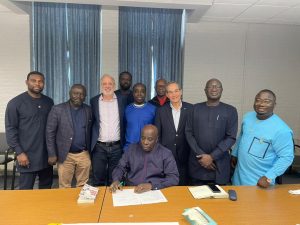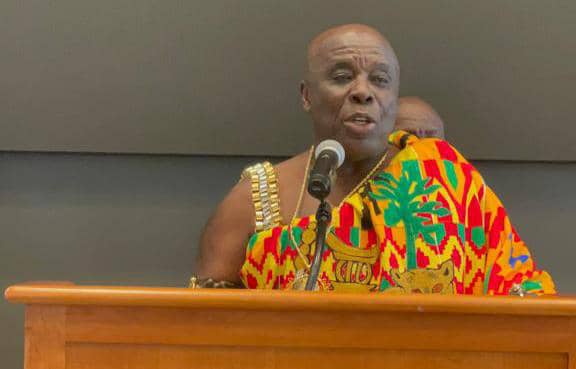The Okyenhene Osagyefuo Amoatia Ofori Panin has expressed deep concern over the ongoing exploitation of African youth in the Gulf countries, where they are lured into slavery with the promise of better opportunities.
The Okyenhene, who is the paramount chief of the Akyem Abuakwa State in Ghana, highlighted the particularly disheartening situation faced by young African women who are forced into domestic and sex slavery in these countries.
Speaking at the Congregational Ceremony of the North Eastern University in Boston, USA, Osagyeufo Amoatia Ofori Panin emphasized the violation of human rights occurring despite the United Nations Universal Declaration of Human Rights, which condemns slavery and servitude.

He highlighted the fact that while all human beings are born free and equal in dignity and rights according to the declaration, this is far from the reality for many Africans.
He attributed these human rights violations to the prevalent poverty in Africa, which he described as multidimensional.
He noted that over one billion people, two thirds of whom are women and children, live in extreme poverty on less than one dollar a day. The majority of adults in Sub-Saharan Africa are engaged in subsistence agriculture, which is heavily reliant on rainfall and lacks year-round employment opportunities. This situation has resulted in mass rural poverty, unemployment, and drudgery.
The Okyenhene also highlighted the impact of climate change on poverty eradication, particularly in developing countries like those in Africa, where agriculture and fisheries, vital sectors for livelihoods, are highly sensitive to climate variations.
He emphasized that African countries lack the resources and capacity to anticipate and respond effectively to the direct and indirect consequences of climate change. These vulnerabilities make poverty reduction efforts and fiscal institutions ineffective.
According to Osagyefuo Amoatia Ofori Panin, conventional policy models for poverty reduction often disregard the unique socio-economic and political conditions in Africa.
He called for a stronger integration of traditional leaders’ knowledge, expertise, and leadership in the fight against poverty.
The Okyenhene urged policymakers to recognize the importance of involving traditional leaders in the design and implementation of policies that affect local communities.
To further address these challenges, the Okyenhene called for deeper collaboration between Okyeman and the North Eastern University in Boston, setting an example for cooperation between traditional leaders in Africa and the global academia. He later signed a Memorandum of Understanding between the Akyem Abuakwa State and the Worcester Polytechnic Institute in the United States, focusing on research activities related to mined land reclamation, eco-tourism, education, and STEM.
The five-year Memorandum of Understanding aims to enhance joint research publications, participation in academic events, scholarships, and exchange programs between institutions in the Akyem Abuakwa State and Worcester Polytechnic Institute.
This collaboration seeks to bridge the gap between academia and traditional leadership to find sustainable solutions to poverty and other pressing issues in Africa.
As the Okyenhene continues to advocate for collaboration and the inclusion of traditional leaders in poverty reduction efforts, it is hoped that these initiatives will contribute to a brighter future for African youth and an end to their exploitation in Gulf countries.
By Vincent Kubi


